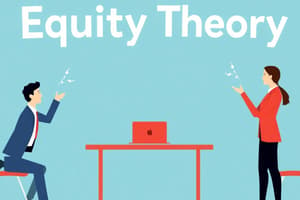Podcast
Questions and Answers
What is equity according to equity theory?
What is equity according to equity theory?
Equity is achieved when an individual's perceived input/output ratio equals the input/output ratio of referent others.
What are the key questions in Expectancy Theory?
What are the key questions in Expectancy Theory?
The key questions are: Is the task worth doing? Will I receive the rewards? Can I accomplish the task?
Name two internal factors that influence compensation strategy in an organization.
Name two internal factors that influence compensation strategy in an organization.
Compensation strategy is influenced by the worth of the job and the employee's relative worth.
What are some external factors affecting employee compensation?
What are some external factors affecting employee compensation?
List three employee benefits required by law in Canada.
List three employee benefits required by law in Canada.
What are flexible benefits plans?
What are flexible benefits plans?
What is one advantage of flexible benefits plans?
What is one advantage of flexible benefits plans?
What is one key duty of employers regarding workplace safety?
What is one key duty of employers regarding workplace safety?
What rights do employees have when it comes to unsafe work conditions?
What rights do employees have when it comes to unsafe work conditions?
What is one responsibility of supervisors in a workplace?
What is one responsibility of supervisors in a workplace?
Why are joint health and safety committees important?
Why are joint health and safety committees important?
What is a primary reason employees unionize?
What is a primary reason employees unionize?
What is the first step in forming a union?
What is the first step in forming a union?
What is the aim of gathering authorization cards during union organization?
What is the aim of gathering authorization cards during union organization?
What should be clarified during the formalization of a collective agreement?
What should be clarified during the formalization of a collective agreement?
What must bargaining teams do before negotiations?
What must bargaining teams do before negotiations?
What is an important consideration for a striking union?
What is an important consideration for a striking union?
Flashcards
Equity Theory
Equity Theory
A theory suggesting that people are motivated when they perceive fairness in the relationship between their inputs (effort, skills) and outputs (rewards) compared to others.
Expectancy Theory
Expectancy Theory
People are motivated to exert effort when they believe their effort will lead to good performance, which will be rewarded with valued outcomes.
Instrumentality
Instrumentality
The belief that successful performance will lead to a specific reward.
Expectancy
Expectancy
Signup and view all the flashcards
Valence
Valence
Signup and view all the flashcards
Flexible Benefits Plans (Cafeteria Plans)
Flexible Benefits Plans (Cafeteria Plans)
Signup and view all the flashcards
Advantages of Flexible Benefits Plans
Advantages of Flexible Benefits Plans
Signup and view all the flashcards
Disadvantages of Flexible Benefits Plans
Disadvantages of Flexible Benefits Plans
Signup and view all the flashcards
Employer's Duty to Inform
Employer's Duty to Inform
Signup and view all the flashcards
Supervisor's Safety Role
Supervisor's Safety Role
Signup and view all the flashcards
Employee Right to Refuse Unsafe Work
Employee Right to Refuse Unsafe Work
Signup and view all the flashcards
Joint Health and Safety Committees
Joint Health and Safety Committees
Signup and view all the flashcards
Reason for Unionization: Dissatisfaction with Management
Reason for Unionization: Dissatisfaction with Management
Signup and view all the flashcards
Union Shop
Union Shop
Signup and view all the flashcards
Unionization Step 3: Organizing Committee
Unionization Step 3: Organizing Committee
Signup and view all the flashcards
Unionization Step 4: Application for Certification
Unionization Step 4: Application for Certification
Signup and view all the flashcards
Collective Bargaining: Prepare for Negotiations
Collective Bargaining: Prepare for Negotiations
Signup and view all the flashcards
Collective Bargaining: Conduct Negotiations
Collective Bargaining: Conduct Negotiations
Signup and view all the flashcards
Study Notes
Equity Theory
- Equity is achieved when the perceived input/output ratio of an employee equals that of referent others.
Expectancy Theory
-
Motivation theory stating that employees increase effort if rewards are perceived as valuable.
-
Key components:
- Expectancy: Can the task be accomplished with effort?
- Instrumentality: Will rewards be received for task completion?
- Valence: Are the rewards valued?
Compensation
-
Internal Factors: Organizational compensation strategy, job worth, employee worth, employer's ability to pay.
-
External Factors: Labor market conditions, area wage rates, cost of living, collective bargaining, legal requirements.
Employee Benefits
-
Required by Law: Canada and Quebec Pension Plans (CPP/QPP), Employment Insurance (EI), Workers' Compensation Insurance, Provincial Hospital and Medical Services.
-
Flexible Benefits (Cafeteria Plans): Employees choose benefits based on their needs. Provides a core package (life/health, sick leave, vacation), and employees use credits to buy other benefits.
-
Flexible Benefits Advantages: Employee-centered needs met, employer competitive advantage with recruitment and retention, workforce adaptability.
-
Flexible Benefits Disadvantages: Potentially higher employer costs if employees choose expensive benefits excessively, extra costs of establishing and maintaining the flexibility.
Employer Duties
- Ensure a hazard-free workplace and comply with laws.
- Document and report work-related injuries/illnesses.
- Ensure supervisor awareness of work hazards.
- Provide safety training and discipline for non-compliance.
- Increasingly required to demonstrate due diligence.
Worker Duties
- Comply with all applicable acts and rules.
- Report hazardous conditions or defective equipment.
- Follow employer safety and health rules (including PPE).
- Right to safe work conditions and safety-related information.
- Right to refuse unsafe work without reprisal.
Supervisor Duties
- Defined as someone with workplace charge and authority over workers.
- Required to advise employees of hazards.
- Ensure safety equipment/device usage.
- Provide written instructions when applicable.
- Take reasonable precautions to ensure worker safety.
Joint Health and Safety Committees
- Most jurisdictions require committees with union and management participation.
- Goal is to foster a safe and healthy workplace.
- Often require certified management and worker representatives.
Reasons for Unionization
- Primarily economic (wages, benefits).
- Dissatisfaction with management, strongly believed to be the most significant motivator regarding promotion, transfer and shift assignment.
- Social and leadership concerns (recognition, affiliation).
Union Formation Steps
- Initial contact: Employees and union officials explore unionization.
- Initial meeting: Organizer schedules meeting to gather support.
- Organizing committee: Employees form a committee to lead the campaign.
- Authorization Cards: Employees sign cards expressing union representation desire.
- Application for Certification: Union files application with labour relations board.
- Certification: Labour Relations Board declares union certification.
- Bargaining Committee: Negotiate collective agreement.
Collective Bargaining Process
- Prepare: Gather data, form bargaining teams.
- Develop Strategies: Identify proposals and limitations, analyze opponent goals. Formulate strike plans.
- Conduct Negotiations: Bargain in good faith, analyze proposals, resolve disagreements.
- Formalize Agreement: Clarify contract language; ratify collective agreement.
- Strikes: Legal requirements vary, involve lockout, strike replacements and boycotts.
Studying That Suits You
Use AI to generate personalized quizzes and flashcards to suit your learning preferences.
Description
Explore the foundational theories of employee motivation, including Equity Theory and Expectancy Theory. This quiz also covers key factors influencing compensation and the various employee benefits required by law. Test your understanding of these important concepts in organizational behavior.



